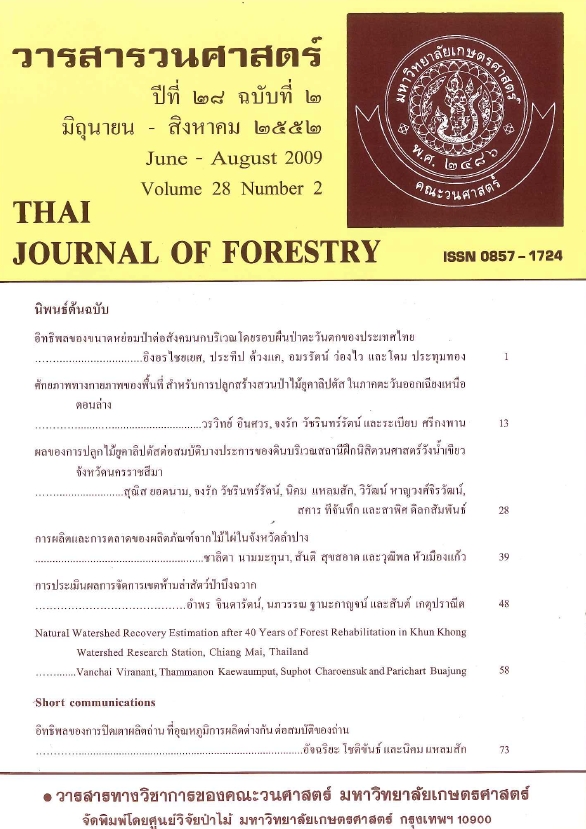Natural Watershed Recovery Estimation after 40 Years of Forest Rehabilitation in Khun Khong Watershed Research Station, Chiang Mai, Thailand
Main Article Content
บทคัดย่อ
The cumulative effects of previous massive deforestation can have catastrophic consequences, particularly flash floods and landslides in every rainy season from May to October. Without any restoration, abandoned land will never develop into forest. To recover degraded land, fast-growing native tree species like pine (Pinus kesiya) have been widely planted in the Imperata grasslands at the head of the watersheds in the northern part of Thailand. Therefore, this study aimed to investigate: (i) the floristic composition after 40 years of forest watershed rehabilitation, and (ii) the recovery period for forest watershed rehabilitation. The data were gathered through vegetation surveys conducted at various ages in pine (Pinus kesiya) reforestation stands and the nearby natural hill evergreen forest as a control area. Non-linear trend analysis was applied to forecast the natural watershed recovery period.
After 40 years, the tree parameters in terms of species richness, Shannon-Wiener diversity index, total basal area, tree density and IVI were highly variable. The planted stands had no clear age-structure distribution and most of the planted trees were found in the 14.5-24.5 and 24.5-34.5 cm DBH classes. Native tree species had established in the lowest class of 4.5-14.5 cm DBH within the clumped distribution of Raunkier class A and class B. The period required for the rehabilitation of degraded land through natural watershed recovery was estimated to be about at least 84-153 years.
Keywords: degraded forest, watershed rehabilitation, floristic composition, non-linear trend analysis, recovery period
Downloads
Article Details

อนุญาตภายใต้เงื่อนไข Creative Commons Attribution-NonCommercial-NoDerivatives 4.0 International License.
ข้าพเจ้าและผู้เขียนร่วม (ถ้ามี) ขอรับรองว่า ต้นฉบับที่เสนอมานี้ยังไม่เคยได้รับการตีพิมพ์และไม่ได้อยู่ในระหว่างกระบวนการพิจารณาตีพิมพ์ลงในวารสารหรือสิ่งตีพิมพ์อื่นใด ข้าพเจ้าและผู้เขียนร่วม (ถ้ามี) ยอมรับหลักเกณฑ์และเงื่อนไขการพิจารณาต้นฉบับ ทั้งยินยอมให้กองบรรณาธิการมีสิทธิ์พิจารณาและตรวจแก้ต้นฉบับได้ตามที่เห็นสมควร พร้อมนี้ขอมอบลิขสิทธิ์ผลงานที่ได้รับการตีพิมพ์ให้แก่วารสารวนศาสตร์ คณะวนศาสตร์ มหาวิทยาลัยเกษตรศาสตร์ กรณีมีการฟ้องร้องเรื่องการละเมิดลิขสิทธิ์เกี่ยวกับภาพ กราฟ ข้อความส่วนใดส่วนหนึ่ง หรือ ข้อคิดเห็นที่ปรากฏในผลงาน ให้เป็นความรับผิดชอบของข้าพเจ้าและผู้เขียนร่วม (ถ้ามี) แต่เพียงฝ่ายเดียว และหากข้าพเจ้าและผู้เขียนร่วม (ถ้ามี) ประสงค์ถอนบทความในระหว่างกระบวนการพิจารณาของทางวารสาร ข้าพเจ้าและผู้เขียนร่วม (ถ้ามี) ยินดีรับผิดชอบค่าใช้จ่ายทั้งหมดที่เกิดขึ้นในกระบวนการพิจารณาบทความนั้น”


